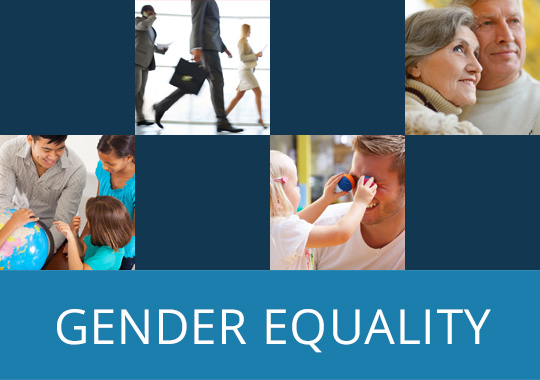About the Gender Equality Commission

Main tasks
Under the authority of the Committee of Ministers, bearing in mind the Council of Europe legal standards, the relevant case law of the European Court of Human Rights and the findings and recommendations of the relevant monitoring mechanisms, the Gender Equality Commission (GEC) steers the Council of Europe’s intergovernmental work in the field of gender equality and advises the Committee of Ministers on appropriate action to be taken in its field of competence. It does so in line with the Council of Europe Gender Equality Strategy for 2024-2029 2 while building on the achievements pursuant to the latest Strategy for 2018-2023.
In particular, the GEC is instructed to:
- take due account of the Reykjavik Declaration3 in conducting its activities and submit proposals for its implementation as appropriate;
- take account of the relevant key findings and challenges set out in the Secretary General’s 2023 Report on the state of democracy, human rights and rule of law “An Invitation to Recommit to the Values and Standards of the Council of Europe”;
- oversee and support the implementation of the Council of Europe Gender Equality Strategy (2024-2029);
- carry out substantive legal and policy analyses and hold peer exchanges on trends, developments and good practices in the member States, including on the basis of the findings of monitoring mechanisms;
- conduct needs assessments and make proposals for the development of common policy responses - including standard-setting activities - to key challenges for member States within its field of competence;
- promote in the political agendas of the Council of Europe member States and beyond the need to prevent and combat all forms of violence against women, including trafficking in persons which disproportionately affects women and girls, and of domestic violence;
- review the implementation of relevant recommendations and guidelines of the Committee of Ministers to member States, including on preventing and combating sexism, in co-operation, where appropriate, with other sectors;
- follow and support relevant co-operation programmes with Council of Europe member States and beyond and, where appropriate, facilitate the dissemination of their results;
- promote gender equality as a visible priority for the Organisation (internally and externally) and, to this end, support the committees and bodies of the Organisation in integrating and implementing gender mainstreaming in their activities;
- engage in co-ordination and joint planning at regional and international level with the European Union, including the European Institute for Gender Equality (EIGE) and the Fundamental Rights Agency (FRA), the UN, in particular UN Women, the World Bank, the OAS, the OSCE, the OECD, other intergovernmental organisations and civil society, with the aim of strengthening equality and enhancing women’s rights as an integral part of universal human rights;
- orient and oversee the activities carried out by its subordinate bodies, notably the Committee of Experts on Artificial Intelligence, Equality and Discrimination (GEC/ADI-AI), jointly with CDADI, and the Committee of Experts on combating technology-facilitated violence against women and girls (GEC/PC-eVIO), jointly with CDPC (cf. separate terms of reference);
- provide input to the Committee of Ministers in view of the regular, high-level dialogue with member States and partners on delivering on the Reykjavik Principles for Democracy;
- raise awareness about Council of Europe standards and tools in its field of competence in the member States and beyond, through the neighbourhood policy and in other international and global fora, including through participation in meetings of the UN Commission on the Status of Women, the Committee on the Elimination of Discrimination against Women and the Human Rights Council;
- hold an exchange of views annually in order to evaluate its activities and advise the Committee of Ministers and the Secretary General on future priorities in its sector, including possible new activities and those that might be discontinued;
- take due account of the following mainstreamed perspectives in the performance of its tasks: youth, children’s rights, rights of persons with disabilities, and Roma and Traveller4 issues;
2 New Strategy under preparation, to be adopted by the Committee of Ministers in 2024.
Previous mandates:




